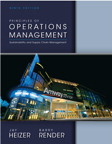|
MAN4504 OPERATIONS MANAGEMENT SYLLABUS
Taught by: Geraldine Klonarides Email: geraldine.klonarides@gmail.com College of Business O |
||||||||||||||||||||||||
|
LAST UPDATED: Tuesday July 05, 2016 04:29:53 PM -0400
|
||||||||||||||||||||||||
|
COURSE LEVEL STUDENT
OUTCOMES/OBJECTIVES
Students will be able to:
Curriculum STUDENT LEARNING OUTCOMES TARGETED
Once you complete your BBA degree, you will be able to:
1. Individually and collaboratively formulate, structure, support,
deliver, receive, evaluate, and adapt written and oral messages.
This includes:
·
Writing effective business
correspondence using various types of media and technology.
·
Researching, organizing,
supporting, and orally delivering business presentations adapted to
diverse audiences.
·
Using pronunciation,
grammar, nonverbal communication, and articulation appropriate to
the designated audience.
4. Apply critical thinking skills to complex business problems. This
includes:
·
Analyzing complex business
problems, particularly ill-structured ones (i.e., business problems
with no “right answer”).
·
Identifying and
evaluating relevant issues and information
·
Generating and evaluating
possible solutions to the problems
·
Recommending solutions
based on a well-reasoned rationale
·
Communicating your thought
processes to others.
6. Demonstrate ethical understanding and reasoning abilities,
including an understanding of the ethical responsibilities of
organizations, by:
·
Recognizing ethical
dilemmas
·
Evaluating how stakeholders
will be affected by various possible solutions to ethical dilemmas
·
Making ethical decisions
·
Providing a rationale for
your decisions using ethical schools of thought.
7. Demonstrate functional skills and knowledge in the study of
business as delineated in the learning goals for your major and the
core subjects.
To provide the basic concepts and tools
for transforming resources into products and services.
To understand how the operations
function fits into the environment within which the firm operates.
To understand the impact of
international business on the operations function.
ASSURANCE OF LEARNING
The College of Business cares about the
quality of your education. More on the College's commitment to
Assurance of Learning can be found at the following link:
http://businessonline.fiu.edu/course_addons/Learning_Commitment.pdf
Please review the policies page as it
contains essential information regarding guidelines relevant to all
courses at FIU and additional information on the standards for
acceptable netiquette important for online courses.
|
||||||||||||||||||||||||
|
To be able to comfortably follow this course as:
COURSE PREREQUISITES
Both 7 and 8 are imperative to communicating with the class
|
||||||||||||||||||||||||
Textbook:
 |
||||||||||||||||||||||||
|
REQUIRED TEXT: Using Principles of Operations Management 9th Edition, by Jay Heiner and Barry Render, Prentice Hall, 2013, 9th edition
ISBN-13: 978-0132968362 ISBN- |
||||||||||||||||||||||||
|
||||||||||||||||||||||||
|
There will be several FEEDBACK sessions during the semester where grades will be posted in the class. These FEEDBACK sessions will be the soonest possible after each exam 1, 2 and 3 and after project 1 and 2. I do not email grades for confidentiality reasons. FEEDBACK 1 Exam 1 FEEDBACK 2 Project 1 FEEDBACK 3 Exam 2 FEEDBACK 4 Project 2
|
||||||||||||||||||||||||
|
The best way to communicate with me is by email. Emails
If your class, for example is MAN 4504 this is what should go as a heading in your email subject line MAN 4504/BBC/Pat Smith/Assignment 1 OR MAN 4504/Online/John Garcia/Absent If you are not attending a class right now your subject line should start off with: YOUR NAME/Subject
Telephone calls Please email me at geraldine.klonarides@gmail.com . Do not call my department to leave a message. The staff in the CBA are there to support the faculty in their duties.
Faxes Do not send faxes.
Dropping in: It is my pleasure to see you. However, "dropping in" does not necessarily mean that there will be enough time to see you or deal with a particular problem. So, if your business is important make sure that you have emailed me or spoken to me first.
|
 Course
Description:
Course
Description: